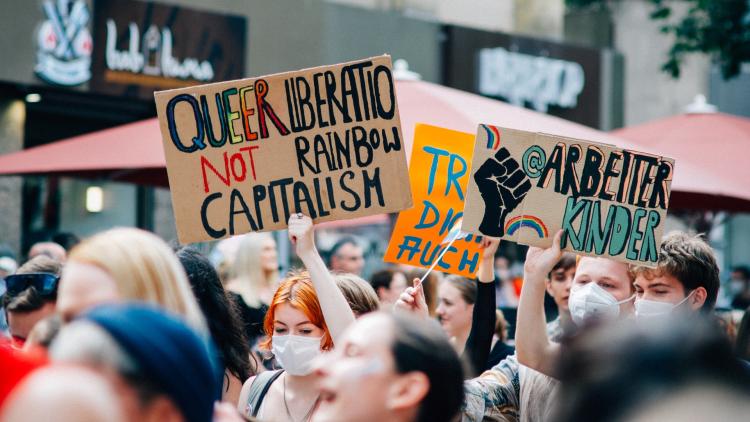Gender, Sexuality in Global Politics (online)

Key information
- Module code
- 15DISD025
- Credits
- 30
- Department
- Centre for Gender Studies
Module overview
This module is at the intersection between feminist/queer and political analysis. It prioritizes critical feminist approaches to knowledge production and feminist and queer interventions in the study of global political and socio-economic processes. The module establishes the conceptual and historical context for understanding the centrality of gender to contemporary societies and global processes and explores the continuum of gendered processes from the intimate level to the global level.
Feminist and queer interventions uncover power dynamics that are central to the liveability of bodies and serve many different purposes: political, cultural, economic. They are primarily preoccupied with the gendered, classed, and racialized component of structural violence and their ultimate unfolding at the global stage. Overall, the course takes an interdisciplinary approach. It provides a comprehensive understanding of the deployment of gender and sexuality around International Relations, International Law, conflict resolution, peace-building, political participation, human rights, development and society and thus encompasses micro, meso and macro levels of analysis.
Students will acquire theoretical and methodological tools to study gender across a range of contemporary events and spheres, including NGO-ization, Metoo, necropolitics, the rise of neoliberalism and populism, peace-building and governance. This course is predicated upon an intersectional approach that upholds the intersection of gender race, class, sexuality, ethnicity and further categories.
This module requires students to think critically about the world through the examination of the gendered aspect of cultural production, policy-making, and politics, among others. Students will gain an interdisciplinary social science foundation, that brings together theoretical grounding in gender theory, feminist approaches to knowledge production, and decolonial approaches. By engaging with a series of key debates related to gender and sexuality, the students will gain an understanding of their centrality to global politics and processes.
The course draws from the wealth of the scholarship on sex, gender, and violence. The topics covered include the continuum of violence, the gendered causes and consequences of war, women’s involvement in violence, the deployment of sexuality in foreign policies. The course also includes seminal and critical policy responses and interventions addressing said violence. Readings in the module include a mix of seminal articles/work by academics from a diversity of disciplines including development reports, legal analysis and academic articles (including book chapters).
Objectives and learning outcomes of the module
This module stresses the importance of thinking gender and sexuality intersectionally whilst exploring their increased mobilization in and relevance to foreign affairs, global development projects, and interventionist policies, among others.
On successful completion of this module a student will be able to:
- Apply gender as a critical analytical lens in a range of contexts
- Acquire an informed analysis of the relevance of feminist/queer approaches to knowledge production and global dynamics.
- Understand the importance of thinking gender and/or sexuality intersectionally.
- Develop the skills needed for further independent research, writing and thinking about complex gendered/racialized/sexualised issues.
- Develop the ability to think critically, with reference to theoretical and empirical (historical and/or contemporary) content about a variety of gendered issues.
Scope and syllabus
Topic list
- Introduction: Feminist and queer IR: where are the women/queers/folx?
- Beyond Binaries: Re-writing Knowledge
- What Sisterhood? Transnational Feminist Approaches
- Beyond Patriarchy
- Necropolitics
- Re-Thinking Borders: Transing and Queering
- Women as Agents of Violence: Beyond the Peace/War Binary
- Beyond Multiculturalism: Gender, Sexuality and Nationalism
- Sexual Regimes and Borders
- (Dis)Abled bodies and Cyborgs: Gender and Technology
- Gender, Sexuality and Protest
Disclaimer
Important notice regarding changes to programmes and modules
